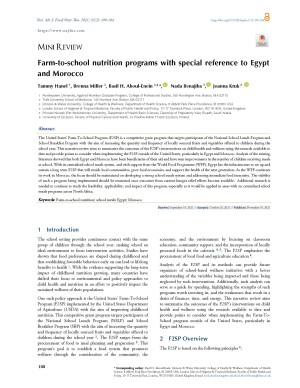Farm-to-school nutrition programs with special reference to Egypt and Morocco
Abstract
The United States’ Farm-To-School Program (F2SP) is a competitive grant program that targets participants of the National School Lunch Program and School Breakfast Program with the aim of increasing the quantity and frequency of locally sourced fruits and vegetables offered to children during the school year. This narrative review aims to summarize the outcomes of the F2SP’s interventions on child health and wellness using the research available to date and provide points to consider when implementing the F2SP outside of the United States, particularly in Egypt and Morocco. Analysis of the existing literature showed that both Egypt and Morocco have been beneficiaries of their aid and have seen improvements in the number of children receiving meals at school. With its centralized school meals system, and with support from the World Food Programme (WFP), Egypt has the infrastructure to set up and sustain a long term F2SP that will enrich local communities, grow local economies, and support the health of the next generation. As the WFP continues its work in Morocco, the focus should be maintained on developing a strong school meals system and addressing immediate food insecurity. The viability of such a program being implemented should be reassessed once outcomes from current hunger relief efforts become available. Additional research is needed to continue to study the feasibility, applicability, and impact of this program, especially as it would be applied in areas with no centralized school meals programs across North Africa.
Full text article
Authors
Copyright (c) 2021 Tammy Hanel, Brenna Miller, Basil Aboul-Enein, Nada Benajiba, Joanna Kruk

This work is licensed under a Creative Commons Attribution 4.0 International License.
-
Attribution — You must give appropriate credit, provide a link to the license, and indicate if changes were made. You may do so in any reasonable manner, but not in any way that suggests the licensor endorses you or your use.
-
No additional restrictions — You may not apply legal terms or technological measures that legally restrict others from doing anything the license permits.





